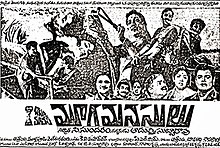Mooga Manasulu
| Mooga Manasulu | |
|---|---|
 Theatrical release poster | |
| Directed by | Adurthi Subba Rao |
| Written by | Acharya Atreya Mullapudi Venkata Ramana (story / dialogues) |
| Screenplay by | Adurthi Subba Rao |
| Produced by | C. Sundaram |
| Starring | Akkineni Nageswara Rao Jamuna Savitri |
| Cinematography | P. L. Roy |
| Edited by | T. Krishna |
| Music by | K. V. Mahadevan |
Production company | Babu Movies |
| Distributed by | Sri Films |
Release date |
|
Running time | 160 mins |
| Country | India |
| Language | Telugu |
Mooga Manasulu (transl. Mute Hearts) is a 1964 Indian Telugu-language drama film written and directed by Adurthi Subba Rao. The film stars Akkineni Nageswara Rao, Savitri and Jamuna, with music composed by K. V. Mahadevan.[1] Mooga Manasulu is based on the concept of reincarnation,[2] the first of its kind in Indian cinema in the genre of semi-fiction intended to be more serious in tone with elements that encourage a broader range of moods throughout the narrative. The film was remade in Hindi as Milan (1967) directed by Rao himself, while the Tamil Praptham (1971) was adapted from Rao's work. The Telugu version received the National Film Award for Best Feature Film in Telugu, and the Filmfare Best Film Award (Telugu) in 1964 and was screened at the Karlovy Vary International Film Festival.[3][1]
Plot[]
The plot of the film is based on the concept of reincarnation and a beautiful love story. Newly married couple Gopi and Radha are on Honeymoon and traveling in a boat on the River Godavari. Gopi cries to the boatman to stop the boat as there were dangerous whirlpools ahead. On reaching the shore, Gopi takes Radha to an old building. The boatman tells them that it belonged to a Zamindar and takes them to the Samadhis, which reportedly belong to that of one Gopi and Radha. They, then, find an old lady lighting a Deepam light at the Samadhis. Gopi recognizes that she is none other than Gowri from his earlier birth. Gowri too recognized him as Gopi and breathes her last in his hands. The main story is narrated as the flashback by Gopi to Radha.
Gopi, an orphan lives on the River Godavari and carries passengers by boat. Radha is the daughter of a Zamindar. She goes to College on the other side of the river. Gopi carries her daily, purely likes her and used to give her a chrysanthemum flower daily. Gowri is a shepherd girl who loves Gopi intensely. Radha's maternal uncle Rajendra lusts after Gowri.
Rajendra's selfish plans result in the marriage of Radha with Ramaraju. As fate otherwise directs, Ramaraju dies and Radha becomes a widow and comes back to the village. Gopi is deeply disturbed by the unfortunate incident and tries to console Radha. Their affection is misunderstood by Gowri and villagers accuse an illegal relation between them, spread by Rajendra. Knowing this, Gopi leaves the village and Radha follow in search of him. Rajendra intends to follow and kill them, but Gowri bargains with him to save them. Both Radha and Gopi die due to the whirlpools in the river.
After narrating the story, the newly wedded couple makes cremation of Gowri beside the Samadhis of Radha and Gopi.
Cast[]
- Akkineni Nageswara Rao as Gopinath
- Savitri as Radha
- Jamuna as Gowri
- Nagabhushanam as Rajendra
- Gummadi as Zamindar
- Padmanabham as Rambabu
- Allu Ramalingaiah as Appanna
- Suryakantham as Ramadevi
- Lakshmikanthamma as Avva
Soundtrack[]
| Mooga Manasulu | |
|---|---|
| Film score by | |
| Released | 1964 |
| Genre | Soundtrack |
| Length | 35:09 |
| Producer | K. V. Mahadevan |
Music composed by K. V. Mahadevan. All songs are evergreen blockbusters. Music released on Audio Company.
| S. No. | Song Title | Lyrics | Singers | length |
|---|---|---|---|---|
| 1 | "Eenaati Ee Bandhamenatido" | Acharya Atreya | Ghantasala, P. Susheela | 4:31 |
| 2 | "Godari Gattundi" | Dasaradhi | P. Susheela | 4:17 |
| 3 | "Muddabanthi Puvvulo Moogakalla Oosulu" | Acharya Atreya | Ghantasala | 4:19 |
| 4 | "Gowaramma Nee Mogudevaramma" | Kosaraju | Ghantasala, P. Susheela | 5:16 |
| 5 | "Naa Paata Nee Nota Palakala Chilaka" | Acharya Atreya | Ghantasala, P. Susheela | 5:20 |
| 6 | "Paadutha Teeyaga Challaga" | Acharya Atreya | Ghantasala | 4:38 |
| 7 | "Mukku Meeda Kopam" | Acharya Atreya | Jamuna Rani | 3:19 |
| 8 | "Maanu Maakunu Gaanu" | Acharya Atreya | P. Susheela | 3:29 |
Awards[]
- National Film Award for Best Feature Film in Telugu - Certificate of Merit
- Filmfare Best Film Award (Telugu) (1964)
References[]
- ^ Jump up to: a b "Chit Chat with Jamuna". 27 April 2009. Archived from the original on 1 May 2009.
- ^ Randor Guy (30 November 2013). "Master movie maker". The Hindu. Retrieved 13 July 2021.
- ^ "11th National Film Awards". International Film Festival of India. Archived from the original on 25 February 2012. Retrieved 13 September 2011.
External links[]
- 1964 films
- Telugu-language films
- Indian films
- Indian black-and-white films
- Films about reincarnation
- Telugu films remade in other languages
- Films scored by K. V. Mahadevan
- Films directed by Adurthi Subba Rao